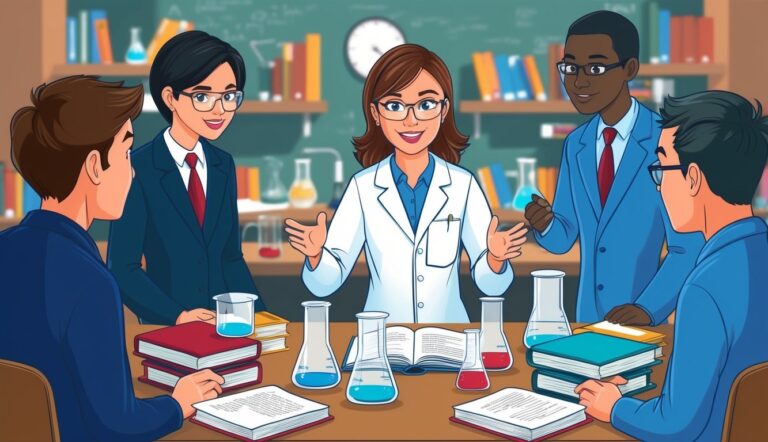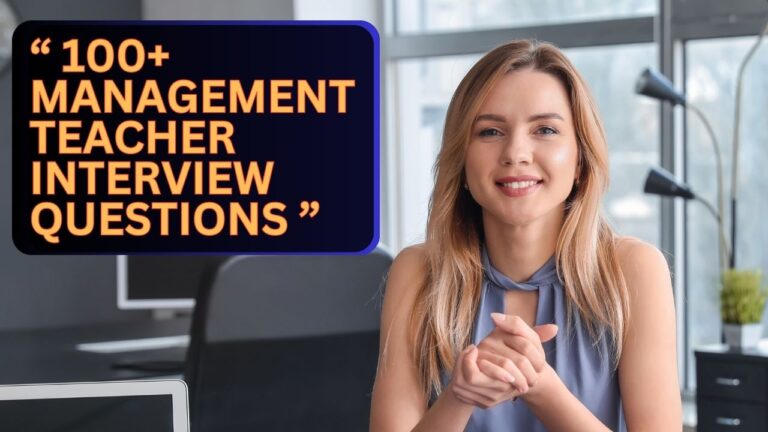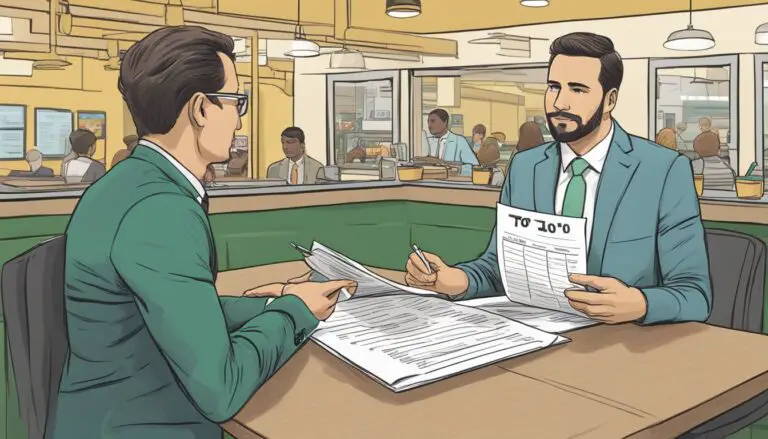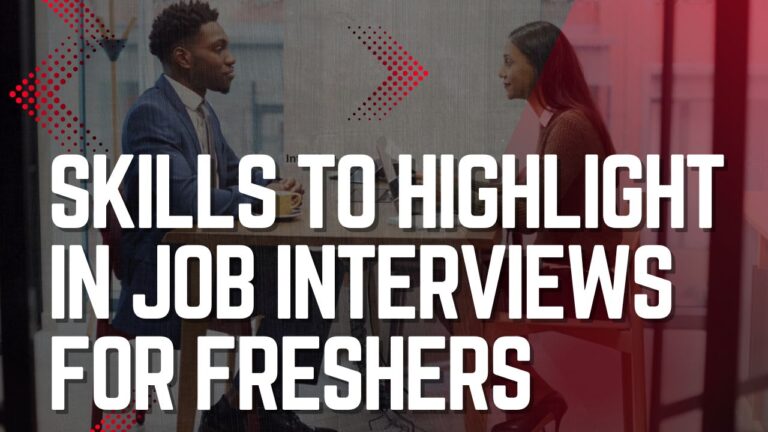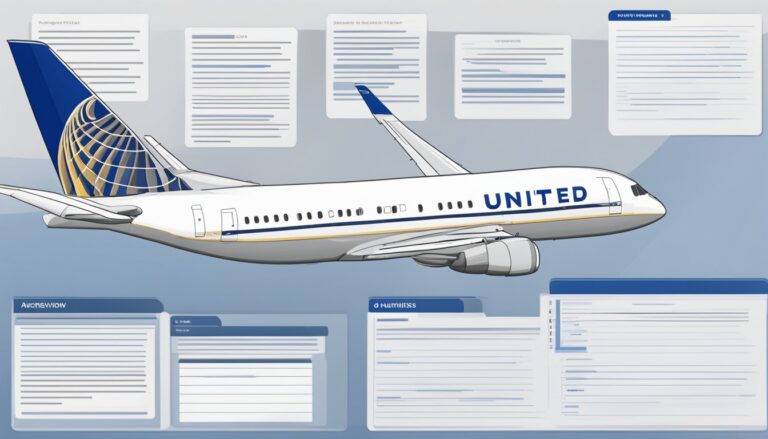75+ Essential Interview Questions (with Sample Answers) for Effective Hiring
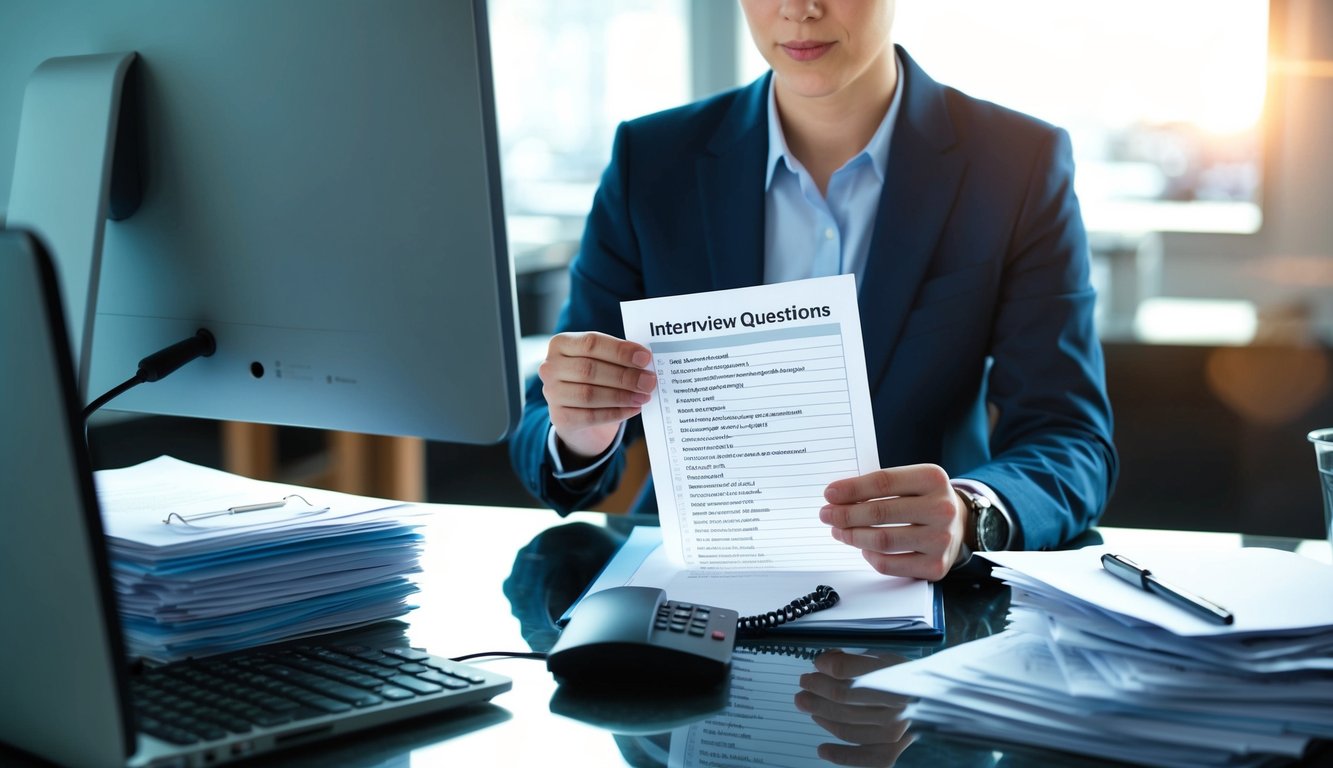
Job interviews often bring a mix of excitement and nerves. The secret to acing them lies in preparation. Understanding what might come your way can significantly boost your confidence and performance. In this post, you’ll discover 75 top interview questions, complete with sample answers.
These examples will help you craft responses that highlight your skills and strengths effectively.

Imagine sitting in a job interview and being asked, “Can you tell me about yourself?” A strong response could be: “I recently graduated with a degree in marketing, where I honed my skills in digital advertising. I completed an internship that deepened my understanding of social media strategies.”
Another common question is, “What are your greatest strengths?” To this, you might reply, “I excel at teamwork and have successfully led group projects with tight deadlines.”
Interviewers also like to ask, “Why do you want to work here?” You could answer, “I’m drawn to your company’s commitment to innovation and sustainability. I look forward to contributing to your team with my skills in project management.”
When faced with, “Describe a challenging situation and how you handled it,” a suitable answer might include, “In my previous role, we faced a sudden deadline shift. I organized the team, prioritized tasks, and met the target efficiently.”
Lastly, when asked, “Where do you see yourself in five years?” a thoughtful answer could be, “I aim to develop my leadership skills further and hope to take on a managerial role where I can contribute to strategic company goals.”
These questions and answers are just a starting point. As you explore the full list, think about how your unique experiences can lead to answers that leave a lasting impression on hiring managers.
Understanding the Interview Process

The interview process can seem challenging. Knowing how it works can ease your mind.
Job interviews are a two-way street. You get to know the company; they get to know you. Preparing ahead helps a lot.
Hiring managers look for candidates who fit the role and the company culture. They may ask questions to test your skills, experience, and problem-solving abilities.
Before your interview, research about the company. Learn about its values, goals, and recent news. This shows you’re truly interested.
Make sure to review the job description carefully. Understand the skills and qualities the employer is seeking. Tailor your responses to highlight these.
Think of questions you might want to ask. This can include the team you’ll work with, the company’s future plans, or training opportunities. This shows you are proactive and engaged.
Stay confident and clear in your communication. Practice can help you express your thoughts more effectively. Remember, the interview is as much for you as it is for them.
Fundamentals of Crafting Responses for Job Interview
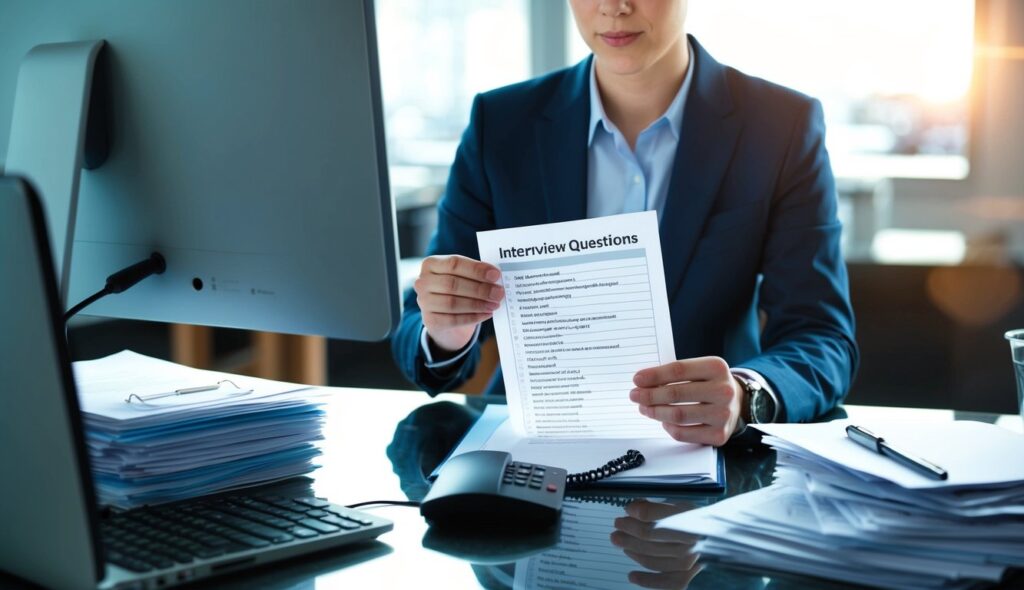
When preparing for an interview, focus on understanding the job description and balancing honesty with professionalism. These elements help create strong and effective responses.
Understanding Job Descriptions
A thorough understanding of the job description is crucial. It outlines the skills and qualifications that the employer is looking for. Highlight key duties and responsibilities. This will help you align your answers with what the employer expects.
Look for specific terms and phrases in the description. Use these as keywords in your answers. Match your skills to the job requirements. This shows you are well-aligned with the company’s needs.
Balancing Candidness and Professionalism
Striking the right balance between being candid and maintaining professionalism is essential. Be honest about your skills and experiences while staying respectful and positive.
Avoid over-sharing personal information that doesn’t relate to the job. Instead, focus on experiences that demonstrate your qualifications and suitability for the role.
Maintain professionalism by using appropriate language and a respectful tone. Confidence in your responses can help build a positive impression. Remember, the goal is to present your best professional self while being true to what you can bring to the position.
Generic Interview Questions
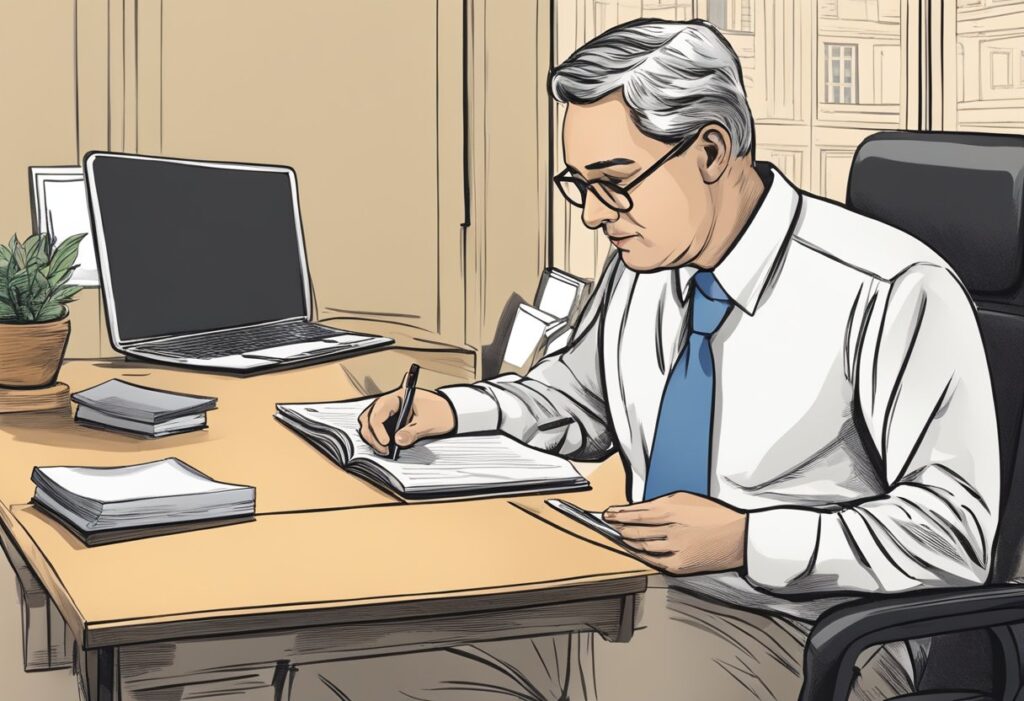
In job interviews, you might encounter broad questions exploring your personal and professional journey, aspirations, and background.
Introductory Questions
These questions often start the interview. They give employers insight into your personality and priorities.
1. Tell me about yourself.
You should highlight personal and professional strengths, but keep it brief.
Answer: You might say, “I am a marketing specialist with a passion for digital campaigns. Outside work, I enjoy graphic design and cooking.”
2. Why are you interested in this position?
Link your skills and career goals to the role you’re applying for.
Answer: “I’ve always wanted to work for a company that values innovation, like yours. My skills in data-driven marketing will add value here.”
3. Describe yourself in three words.
Choose qualities that match the job description.
Answer: “Creative, dedicated, and motivated.”
4. What do you know about our company?
Research their history, mission, and recent achievements.
Answer: “Your commitment to sustainability in all product lines is inspiring. I admire your recent initiative in using eco-friendly packaging.”
5. What motivates you to succeed?
Mention what drives your professional passion.
Answer: “The desire to improve and see tangible results keeps me motivated, especially when a campaign boosts engagement.”
Career Pursuits and Aspirations
These delve into your long-term ambitions and how this role fits into them.
1. What are your career goals?
Be honest and align goals with potential growth in the company.
Answer: “I aim to lead a team in digital transformation projects. Your company’s innovative approach helps me achieve this.”
2. Where do you see yourself in five years?
Focus on professional growth.
Answer: “I hope to have progressed to a senior management role where I can lead strategic planning.”
3. Why did you choose this career path?
Show enthusiasm and reasoning for your choice.
Answer: “Marketing combines my passions for creativity and analytics, shaping consumer experiences.”
4. How do you prioritize your career goals?
Share how you balance short and long-term aims.
Answer: “I set quarterly objectives and check them against my five-year plan to stay on track.”
5. What would make you leave a job?
Be candid but professional.
Answer: “Lack of growth opportunities or a misalignment with my values might prompt a change.”
Background and Work Experience
Your past experiences reflect your ability to succeed in new roles.
1. Walk me through your resume.
Summarize important roles, key achievements, and transitions.
Answer: “After earning my degree in marketing, I worked at a startup where I led a successful product launch, doubling site traffic.”
2. What is your greatest professional achievement?
Highlight a specific, impactful success.
Answer: “I developed a social media campaign boosting sales by 10% in one quarter.”
3. Tell me about a challenge you’ve overcome.
Describe the situation, action, and result.
Answer: “Faced with declining engagement, I revamped our content strategy, leading to a 20% increase in interaction.”
4. How do you handle failure?
Focus on lessons learned and improvements made.
Answer: “When a campaign did not meet expectations, I analyzed metrics, made necessary adjustments, and saw marked improvement.”
5. Describe your work style.
Share how you best function to meet goals.
Answer: “I thrive in collaborative environments, leveraging team strengths for optimal outcomes.”
Behavioral Interview Questions

Behavioral interview questions help you show your problem-solving skills and how you work with others. They reveal your experience with challenges, working in teams, and how well you manage your time. Let’s look at these areas closely.
Handling Challenges
- Describe a time you faced a significant challenge at work. What did you do? When you describe your biggest challenge, focus on the steps you took to overcome it. Show your problem-solving skills with a clear example.
- Give an example of a difficult goal you set and achieved. How did you do it? Mention how you broke the goal into smaller tasks. This shows your ability to meet ambitious targets with determination.
- Tell me about a time you failed. What did you learn? Discuss a specific failure, but emphasize your learnings and improvements after the incident.
- How do you handle unexpected problems? Can you give an example? Focus on your quick thinking and adaptability, using a real-world scenario.
- Describe a mistake you made at work. How did you fix it? Highlight how you recognized and corrected the mistake. Focus on accountability and learning.
Teamwork and Conflict Resolution
- Tell me about a team project you worked on. What was your role? Describe your specific contributions and how your role supported team success.
- Describe a conflict you had with a coworker. How did you resolve it? Explain how you used conflict resolution skills, focusing on active listening and compromise.
- Have you ever had to give someone difficult feedback? How did it go? Share how you approached the situation tactfully and the outcome of the discussion.
- How do you handle disagreement in a team? Talk about your strategy for ensuring open communication and finding common ground.
- Describe a time when you worked with someone difficult. What did you do? Discuss your strategies for maintaining professionalism and focusing on team goals.
Time Management and Organization
- How do you prioritize your tasks? Give an example. Explain your method for managing tasks effectively, such as using a planner or lists.
- Describe a time you had to meet a tight deadline. How did you manage? Focus on the organizational skills you used to plan your tasks and avoid stress.
- What tools or methods do you use to stay organized? List specific tools or techniques, like digital calendars or time-blocking.
- Tell me about a time you had too many tasks at once. What did you do? Explain how you reassessed priorities and used organizational skills to manage workloads.
- How do you ensure productivity during busy periods? Discuss strategies like setting specific goals and ensuring regular breaks to maintain productivity.
Personal Fit and Company Culture

When preparing for an interview, understanding your fit with the company’s culture is essential. This involves evaluating how well your values align with the company’s mission and how motivated you are to contribute to its success. Additionally, exploring opportunities for personal growth within the organization can help ensure a fulfilling career trajectory.
Assessing Cultural Fit
Questions about cultural fit help both you and the employer understand if you’ll thrive in the work environment.
1. How do you describe the company’s culture, and what should employees expect?
Learn what daily life is like to see if it aligns with your work style.
2. What types of personalities succeed here?
Identifying key traits of successful employees helps you assess your fit.
3. How does the company handle work-life balance?
Understand how work is managed and balanced with personal life.
4. What values do the company and employees share?
Look for shared core values to gauge long-term compatibility.
5. What is it like to work with the leadership team?
Understand the management style and if it fosters growth.
Motivation and Engagement
Motivation and engagement are vital for ensuring that you are both productive and fulfilled in your role.
1. Why do you want to work at this company?
Explain what attracts you to the company and aligns with your aspirations.
2. How do you stay motivated in challenging situations?
Showcase your problem-solving and resilience under pressure.
3. What parts of your job are most engaging for you?
Identify tasks that excite you and how they contribute to the company.
4. How does the company keep employees motivated during transitions?
Discover the support and resources provided during periods of change.
5. How are achievements recognized and rewarded here?
Learn about the acknowledgment of hard work and incentives offered.
Personal Growth and Development
Focusing on growth ensures that your career keeps progressing and evolving over time.
1. What opportunities for professional development does the company offer?
Assess the available resources for skills enhancement and career progression.
2. How does the company support career advancement?
Understand pathways for promotion or new roles within the organization.
3. What are some examples of personal growth achieved here?
See real-life examples to imagine your potential trajectory at the company.
4. How are performance reviews conducted?
Learn about the feedback process and how it aids development.
5. How does mentorship or coaching work within the company?
Identify the support systems in place to nurture your growth and success.
Questions About Skills and Competencies

When interviewing, it’s important to ask about skills and competencies to find out if candidates have the necessary qualifications.
Focus on technical abilities and job-specific skills, assess management style to see if they can lead effectively, and evaluate communication skills to ensure they can work well with others.
Technical and Job-Specific Skills
Understanding technical skills can help you see if someone is fit for the job. You can ask questions that reveal their abilities and how they apply technical knowledge in their work.
- What software or tools are you most experienced with?
Example Answer: “I have extensive experience with Adobe Creative Suite and often use Photoshop for graphic design projects.” - Can you describe a complex project and your role?
Example Answer: “I led a team to develop a new app feature, coordinating between designers and developers.” - How do you stay updated with industry developments?
Example Answer: “I regularly attend workshops and webinars related to my field.” - Explain a technical problem you solved.
Example Answer: “I fixed a bug in our system that was causing significant data loss by analyzing the code and identifying the issue.” - What is your approach to learning new technologies?
Example Answer: “I take online courses and try out new tools through small, hands-on projects.”
Leadership and Management Style
These questions focus on how candidates lead a team. Discovering their management style can indicate if they’re capable of motivating and guiding others effectively.
- Describe your leadership style.
Example Answer: “I believe in participative leadership, encouraging team input on important decisions.” - How do you handle conflict within a team?
Example Answer: “I address issues directly but fairly, listening to all parties to find a solution.” - Can you give an example of a leadership challenge you faced?
Example Answer: “A team member wasn’t meeting deadlines, so I implemented a new tracking system to increase accountability.” - What strategies do you use to motivate your team?
Example Answer: “I set clear goals and recognize achievements to maintain high team morale.” - How do you prioritize and delegate tasks?
Example Answer: “I assess urgency and team strengths, assigning tasks based on individual capabilities.”
Communication and Interpersonal Skills
Communication skills are crucial in every role. These questions explore a candidate’s ability to engage and collaborate effectively with others.
- How do you communicate with team members?
Example Answer: “I use open channels like Slack and regular meetings to ensure everyone is informed.” - Describe a time you worked with a difficult colleague.
Example Answer: “I approached them privately to understand their perspective and worked on a solution together.” - How do you adapt your communication for different audiences?
Example Answer: “I tailor my language and examples based on whether I’m speaking with technical or non-technical audiences.” - What techniques do you use to build rapport with coworkers?
Example Answer: “I take an interest in their work and organize team events to build strong relationships.” - How do you handle feedback, both giving and receiving?
Example Answer: “I offer constructive feedback promptly and openly, and I try to be receptive and reflective when receiving feedback.”
Difficult and Tricky Interview Questions
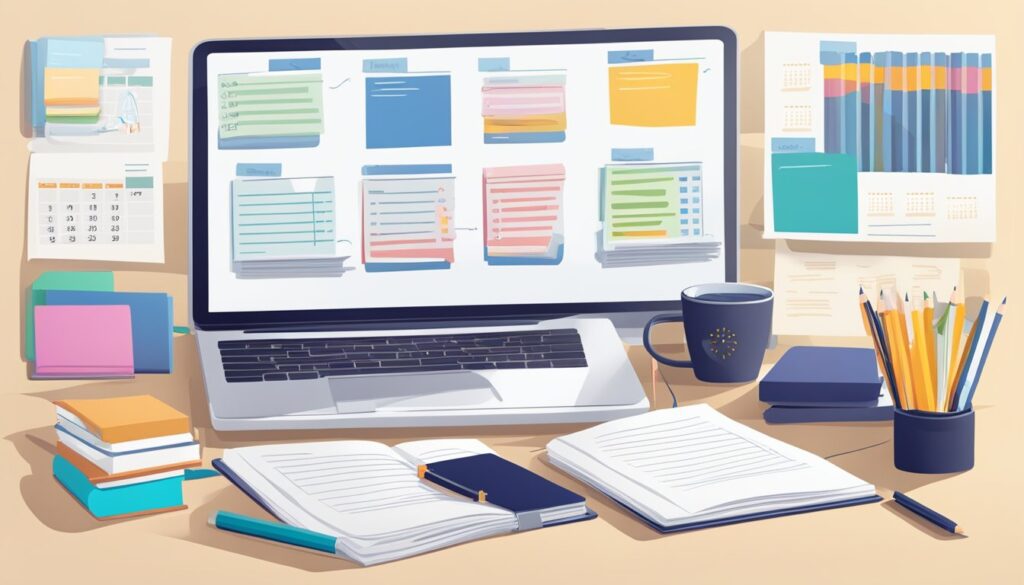
Interviewers often challenge candidates with tough questions. These aim to probe deeper into a candidate’s abilities and thought processes. Preparing for these can increase your confidence and help you handle these challenges effectively.
Discussing Weaknesses and Failures
- What is your greatest weakness? Answer: Identify a real weakness but choose one that does not affect the main skills needed for the job. Explain how you’re actively working to improve it.
- Describe a time you failed. What did you learn? Answer: Share a specific example, focusing on what you learned and how you’ve applied those lessons.
- Tell me about a challenging situation and how you overcame it. Answer: Use the Formula: Situation, Task, Action, and finally the Result to structure your response.
- How do you handle criticism? Answer: Show that you welcome feedback to grow, and give an example of how it helped improve your work.
- Have you ever disagreed with a boss? How did you handle it? Answer: Demonstrate respect and professionalism, explaining your approach to finding a solution or compromise.
Salary Expectations
- What are your salary expectations? Answer: Do your research and provide a range, stating your flexibility along with your understanding of industry standards.
- How do you handle negotiations about salary? Answer: Convey confidence in your value without sounding demanding, highlighting your skills and experiences.
- What was your salary in your last job? Answer: You can choose to share or pivot to emphasize your market research and expected range for the position.
- Do you know the salary range for this role? Answer: State what you’ve learned from research and ask if it aligns with the company’s range.
- How do you prioritize salary over job satisfaction? Answer: Balance your response by showing appreciation for both fair compensation and a fulfilling role.
Handling Unexpected Questions
- If you were an animal, what would you be? Why? Answer: Choose an animal with traits that reflect qualities that are useful for the role, like perseverance or teamwork.
- How do you stay organized? Answer: Describe specific tools or methods you use to keep track of tasks and manage time efficiently.
- What would you do if you won the lottery? Answer: Show enthusiasm for what you do, even if not motivated by money alone, while also mentioning a sensible plan.
- Describe your perfect day. Answer: Keep your description balanced between work and personal life, showing a healthy integration of both.
- Would you rather work alone or as part of a team? Answer: Highlight flexibility and the advantages of each mode depending on the situation.
Frequently Asked Questions

These are common questions interviewers ask to learn more about you and how you fit the role. Being ready to answer them can help you make a strong impression.
Can you tell me a little about yourself?
Start by highlighting key experiences and achievements till date. Focus on what makes you a great fit for the job. Avoid personal details unrelated to the role.
Why are you interested in this role?
Mention specific aspects of the job or company that excites you. Connect these to your skills and experiences. This shows you’ve done your research and are genuinely interested.
How do you handle stress and pressure?
Share strategies that help you stay calm and focused. Discuss any past experiences where you successfully managed a stressful situation.

What is your greatest strength?
Identify a strength that relates to the job. Provide examples of how this strength has helped you succeed in the past. This shows your capability to add value.
Where do you see yourself in few years?
Talk about your career goals and how they align with the company. Showing commitment to professional growth makes you an appealing candidate.
All the Best !

